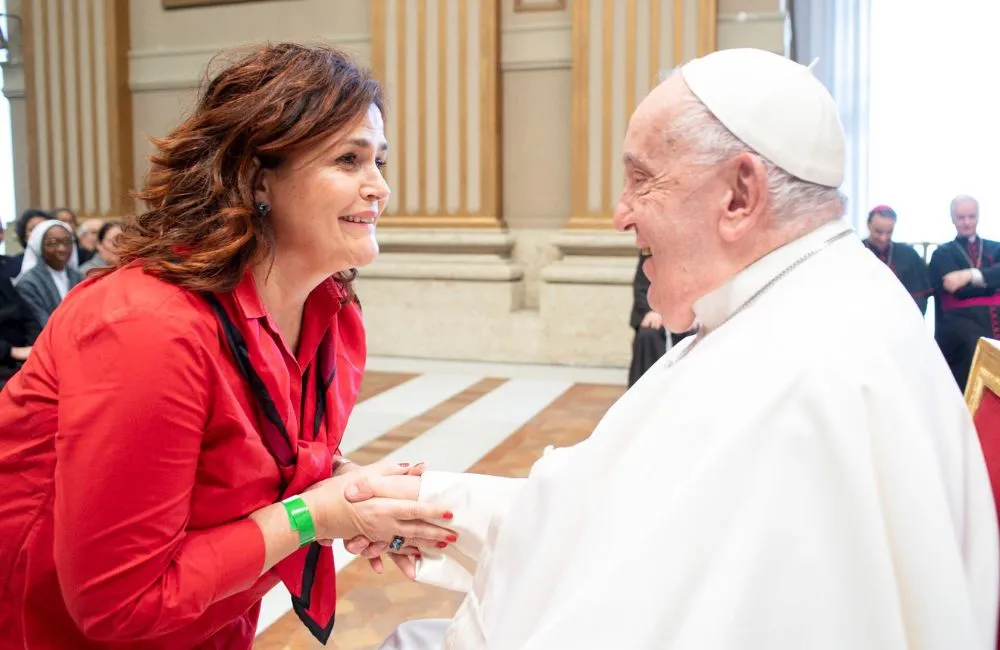
Ines A. Murzaku, Ph.D., professor in the Department of Religion and director of the Catholic Studies Program at Seton Hall University, participated in the International Congress on the Future of Theology: Legacy and Revisioning held Dec. 9-10 at the Pontifical Lateran University in Rome. The gathering, organized by the Dicastery for Culture and Education, brought together theologians, scholars, and educators from around the world to explore the future of theology and its relevance to the modern world.
Murzaku was deeply inspired by Pope Francis’ address that opened the event, during which the Holy Father shared profound reflections on theology’s role in contemporary society. For Murzaku, the experience was made even more memorable by the opportunity to engage personally with the Pope, an encounter that left a lasting impression.
Sharing her reflections, Murzaku said the Holy Father’s address profoundly moved her. “He likened theology to light—a force that works quietly and humbly to illuminate the Gospel of Christ. Just as light cannot be contained, theology too must transcend the confines of books and academic discourse; it must be lived and enacted in the world.”
Murzaku explained that Pope Francis emphasized the necessity of a practical and transformative theology, one that fosters a dynamic relationship with God and encourages critical rethinking of how we approach faith and reason. He spoke about the importance of theology being accessible and relevant to those in the midst of life’s pivotal moments. In particular, the Pope highlighted the struggles often encountered in middle age, such as existential questions and personal crises, and suggested that theology can provide the guidance needed during these times of uncertainty.
“Middle age is a time when professional and personal stability may be accompanied by profound challenges,” Pope Francis observed. “Theology, in such times, can serve as a compass, helping to renew their search for meaning. Let theology become a welcoming space… where seekers can rediscover their path.”
The Congress also tackled critical issues such as the integration of interdisciplinary perspectives—drawing from fields like literature, music, and science—and the geographical and cultural diversity within theology. One of the most compelling discussions for Murzaku was the Pope’s call for greater inclusion of women in theology. The Pope stated, “An all-male theology is an incomplete theology,” urging the Church to expand the participation of women in theological scholarship and practice.
The Holy Father’s vision for theology was clear: it must move beyond oversimplification and embrace complexity, serving as a guiding light in an often-divided world. “Theology,” Pope Francis concluded, “should help us rethink how to think,” fostering a discipline that inspires new ideas and approaches.
Rev. Gerald Buonopane, Ph.D., vice provost for academics and Catholic identity at Seton Hall, praised Murzaku’s participation in the event, noting its importance for both her and the university. He added, “By doing so, Dr. Murzaku spotlights Seton Hall University to the global theological community. The words of the Holy Father that theology is not confined to ‘books or academic discourse’ but needs to be lived out in the world ring true here at Seton Hall by the university’s infusion of the Catholic intellectual tradition.”
Reflecting on her experience, Murzaku said, “There is much to unpack in the Holy Father’s message, requiring both time and thoughtful reflection. True theology speaks to both the mind and the heart, harmonizing intellect and compassion—which I believe to be an imperative to which all educators are called.”
Read the Address of the Holy Father to Participants at the International Congress on the Future of Theology: Legacy and Revisioning here.
Featured image: Ines A. Murzaku, Ph.D., met and conversed with Pope Francis during the International Congress on the Future of Theology: Legacy and Revisioning in Rome from Dec. 9-10. (Photo courtesy of Vatican Media)